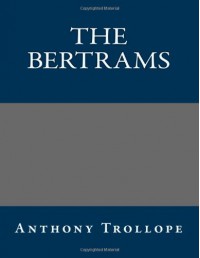The Bertrams (Trollope)

According to Trollope's autobiography (1) he didn't think much of this novel, and was particularly critical of his plot and (2) it didn't sell at all well, unlike his other 1859 work, Dr. Thorne.
Well, Trollope may not always have been a particularly good critic of his own work, but I'm inclined to go along with him in this case. The structure of the book is definitely awkward; there are long stretches - including the first half-dozen chapters - dealing not with the nominal protagonist, George Bertram, but with a secondary protagonist, Arthur Wilkinson. Though we're obviously invited to a compare and contrast exercise, it doesn't really work all that well. The plots are insufficiently parallel, and the two just seem to bump into each other now and again instead of illuminating one another in any meaningful way. In both plots, one member of a possible couple (in one the man, in the other the woman) hold off the coupling because of financial worries. Though they both eventually overcome their fears and couple up without the financial worries being fully resolved, I don't think Trollope ever really makes a good case that the financial worries were worth ignoring.
Beyond plot problems, however, my chief quarrel with this book is with the characters. Unlike most of the others I've read so far, this one doesn't have a sane, fallible, generous middle-aged male at its centre, and we really feel the lack. The principal male and principal female (George Bertram Jr. and Caroline) play a sort of intensified pride and prejudice game that results in unhappiness for both (she holds him off out of economic insecurity, and he pushes her away out of unreasonable jealousy and pride; she marries inappropriately, and everybody's Terribly Miserable). It's hard to like either one of them. The old miser uncle, also named George Bertram, could have actually had a bit of character arc to him - there were occasional tantalizing hints that his better nature was overcoming his inbuilt avarice - but no, his real feelings had to be largely suppressed in favour of building up the suspense over the revelation of his will at the end. Trollope does cleverly pull a bit of a fast one there, because he has his readers hoping that the will provide some sort of ex machina resolution to everyone's misery, so there's a bit of genuine anxiety. However, the will's more or less predictable based on previous events, so it falls on the Nasty Wrong Husband (tm) to provide the ex machina resolution himself by getting depressed and "destroying himself", as they so politely put it. I don't think even Trollope really believed that was fully in character for the self-confident, flashy, selfish Sir Henry Harcourt. It was just too obviously necessary to bring the ship into its happy-ending port. The secondary couple are all right, but she's a bit twee, and his moral struggle - putting his mother in her place when she gets a bit uppity and wants to actually run the household she's had for all of the young man's life - left a bad, bad taste for anyone who's left Victorian gender-roles far behind. That all said, there are a couple of "aunty" figures who are pleasant and enjoyable.
The chief interest of this novel is its travelogue aspect. There are two trips in it. The first and longer one is to the Holy Land, where Trollope's disdainful colonialism (problematic) and distaste for touristy gimmicks (not problematic) are balanced by a couple of genuinely thoughtful passages of description, particularly of the Mount of Olives. In the second one, to Egypt, the abusive description and colonial disdain is harsher. He found Alexandria out-and-out horrible, and Cairo "crumbling" (except for the little English bit of it). The local men are uniformly described as dirty, and the Muslim women as very ugly behind their "bits of cloth". I got the impression that Trollope didn't enjoy this part of his actual trip much. He certainly didn't much like his trip into a pyramid! Nonetheless, and certainly for someone like myself who hasn't read much in the way of straight travel writing from this period, there was an interest in the direct reports, understanding that they came from a recent trip from a middle-level civil servant who probably did most of the "usual things".
Bit of a miss for Trollope, but he was, after all, churning out these novels on an alarmingly frequent schedule.
 1
1
 2
2



